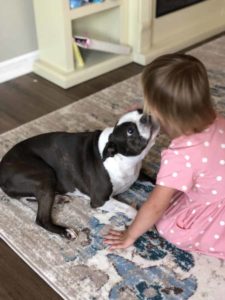The Boston Terrier is a lovable, energetic, and loyal dog, and it’s hard to imagine that there could be any downside to owning one. Unfortunately, the Boston Terrier is one of several breeds that are prone to snoring. When Boston’s sleep they snore, and we’re not talking a light, soft snore, but a loud, persistent one.
While your dog’s snoring can be funny and endearing at times, it can also be downright annoying and distracting. Of course, you love your Boston Terrier, and no amount of snoring will change that. However, you may want to know why your Boston Terrier snores. What does it mean about his health? And if there are any means to manage or prevent the snoring altogether. Our guide will cover snoring in dogs, and in particular, your Boston Terrier.

How to stop your Boston Terrier from snoring.
There are several ways to stop your Boston Terrier from snoring. Here are some tips. Be sure to give your pup a pillow. Encourage your Boston to use a round bed. Clean your Boston’s bedding regularly. Keep the air in your home clean. Limit exercise during the heat of the day. Clean and change the water dish.
I will expand on all these tips further in the article.
Why do dogs snore?
As with people and other breathing beings, dogs can snore for many reasons, most of which are natural and perfectly harmless. Often, dog owners find it funny or cute to hear their dog snoring, although at times it can be a bit much. Especially if your dog shares your bedroom. Snoring is a sound created by the vibrations of air moving through the respiratory system during sleep. Any obstruction of the airway results in a snoring sound produced by the soft palate and uvula.
Many dogs snore, and often it is due to their body position when they sleep. For example, dogs who like to sleep on their backs are more likely to snore if their tongue blocks part of the airway. Sometimes, a dog snores simply because the tissue in the mouth and throat are touching. Generally, snoring isn’t a significant issue for a dog. However, in some cases, it can indicate an underlying condition that may require attention.
Can snoring indicate a health problem?
Yes, snoring in dogs can sometimes indicate a variety of health problems. Which is why it’s always a smart move to talk with your veterinarian about your dog snoring. You will want to speak to your vet, mainly if the snoring is sudden and loud. Or if it seems to interfere with the dog’s ability to get a good night’s sleep. Here are some of the important canine health conditions associated with snoring:
Allergies
Dogs can suffer from a range of allergies, especially Bostons. Allergies can inflame the tissues in your dog’s throat and nasal passages, causing mild to severe airway blockage depending on the severity of the allergic reaction. This blockage may lead to snoring and can be accompanied by watery discharge from the nose.
Common allergens can cause dog allergies:
- Dust
- Pollens and grasses
- Bug bites or bee stings
- Secondhand smoke
- Mold spores
- Environmental irritants (cleaning solutions, detergents, etc.)
- Foods
If your dog has suddenly developed an allergy, take him to the veterinarian to have him examined. Often, medications are available that will soothe your dog’s allergic inflammations and stop him from snoring when he sleeps.
Medications
Sometimes medications prescribed for dogs restrict their airways. Medicines such as muscle relaxers, pain relievers, antihistamines, and sedatives, can cause deep levels of relaxation. This may cause your dog’s throat to loosen up more than usual. In many cases, these types of medications will cause your dog to snore.
Infections
Similarly to people, dogs can suffer from respiratory ailments and infections, such as kennel cough. These flu-like conditions can block and inflame your dog’s airways, causing temporary snoring to occur. Once your dog has recovered from his ailment, the snoring should disappear. If it doesn’t, take your dog to the veterinarian for an examination.
Bella, my Boston, had recently gotten kennel cough. This respiratory infection sounds terrible. Bella was walking around the house for three days with a terrible wheezing sound. In Bella’s case, I do not recall any increase in her snores.
Nasal Obstructions
Dogs love to sniff and smell anything and everything possible. As such, their noses are often on the ground and in whatever crosses their path. This reliance on smell means that dogs are susceptible to getting foreign bodies, such as grasses, seeds, water, or other materials, lodged up their noses. Any obstruction like those mentioned will block your dog’s nose and cause him to snore. See your dog’s veterinarian to have any blockages safely removed from your dog’s nasal passages.
Obesity
Excessive weight is perhaps the most common reason for snoring in dogs, just like humans. In many cases, a dog doesn’t even need to be obese to develop a snoring habit. Simply being a little overweight is often enough to do the trick.
A dog who is carrying around some extra pounds will develop fatty pads around his throat. Over time, and especially with continued weight gain, those pads will press against the throat and interfere with airflow. Keeping your dog within a healthy weight range, or taking steps to help him lose excess weight gradually, will reduce or eliminate his snoring issues.
Anatomy and Genetics
Some dog breeds are prone to snoring due to their anatomy and genetics. Amongst the most well-known are the brachycephaly breeds, smaller dog breeds that have shorter snouts and square, broadheads…Boston Terriers.
These short-nosed dogs have shorter breathing passages, which makes them far more likely to snore than most other dog breeds. Brachycephalic dogs not only have shorter noses. They also the following conditions that contribute to frequent snoring.
Brachycephalic Conditions Causing Snoring:
- Enlarged and elongated soft palate
- Smaller nostrils
- Excessive throat tissue
- Everted laryngeal saccules where the soft tissue is pulled into the airway causing blockages
- Nasal stenosis, or fully or partially blocked nostrils
Be Watchful
If you have a brachycephalic dog, like a Boston Terrier, you need to be vigilant about his snoring levels. Often, your Boston Terrier will just reposition himself during sleep to get access to more comfortable oxygen levels. However, frequent snoring in these dog breeds can lead to inactivity, lower oxygen levels, snoring while awake, difficulty breathing, and distress.
Brachycephalic Airway Obstruction Syndrome
In extreme cases, this condition is referred to as Brachycephalic Airway Obstruction Syndrome (BAOS), and the Boston Terrier is highly prone to developing this condition. Even mild cases of BAOS are likely to disrupt your Boston Terrier’s sleep pattern and prevent him from engaging in even moderate amounts of exercise. BAOS is a genetic, progressive, and life-long condition associated with brachycephalic dog breeds.
While there is no cure, steps can be taken to improve your dog’s snoring. If the condition worsens, surgery may be a viable option to improve your Boston Terrier’s quality of life.
Interested in learning more about the health issues affecting Boston Terriers? Check out my article on the 10 Common Boston Terrier Health Issues.

What dog breeds are more prone to snore than others?
Although any dog can, and probably will, snore at some point, only brachycephalic dog breeds are prone to do so more than any others. Here are the brachycephalic breeds most likely to suffer from BAOS and subsequent snoring:
- Boston Terriers
- Boxers
- Bulldogs (American, English, and French)
- Bull Mastiff (English and Neapolitan)
- Cavalier King Charles Spaniel
- Chinese Shar-Pei
- Chow Chows
- English toy spaniels
- Japanese Chin
- Lhasa Apso
- Pekinese
- Pugs
- Shih Tzu
Like the Boston Terrier, all of these dog breeds have the characteristic square head and a short snout with a pushed-in face. While these inherited traits make Boston’s all the more prone to brachycephalic health issues, they don’t prevent Boston’s from being popular.
What can be done to limit snoring or prevent snoring?
Everyone wants a good night’s sleep, your Boston Terrier included. Is there anything that you can do as a pet parent to limit or prevent your dog’s snoring?
Yes, BAOS is an inherited condition. However, here are some steps you can take at home to make it easier for your Boston Terrier to enjoy his snooze without excessive snoring.
Give your pup a pillow.
Elevating your dog’s head while he is sleeping may help him snore less.
Encourage your dog to use a round bed.
Lying on his side in a curled up position will help to open up your dog’s airways and let those air passages expand.
Clean bedding regularly.
Whether it’s your dog’s bed or your own bed, washing regularly will cut down on allergins. Be sure to use hypoallergenic laundry soap.
Keep the air clean.
Eliminate allergen irritants in the air with a humidifier and vacuum with a HEPA filter. Don’t smoke in the house and avoid using air fresheners or real candles.
Limit exercise.
Avoid exercising your Boston Terrier in the middle of the day when it is humid and hot. Not only will this irritate his BAOS and lead to more snoring, but it can endanger his health.
How much exercise should a Boston be getting? Check out my article covering Boston Terrier Exercise.
Clean and change the water dish.
Give your Boston Terrier fresh water at least twice a day and add some water to his food as well. Nasal tissues can be kept moist and comfortable when your dog drinks more water.
Again, if your dog’s snoring is out of hand, videotape him and show the video to your veterinarian. A professional may have additional ideas or medication available to help your pup sleep better and quieter.
Final thoughts…
Eliminating your dog’s snoring will not happen overnight. Snoring elimination is a process that will take time. In the case of brachycephalic dog breeds, because a genetic condition causes the snoring, it will likely never be cured completely.
However, in Bella’s case, it seems her snoring had gotten better as she got older. I rarely hear her snore anymore.
Observe your Boston Terrier, and take him to the veterinarian if his snoring is constant or he is struggling to breathe. In the meantime, be patient, grab some earplugs, and use this guide to help you and your Boston Terrier get some much-needed shut-eye.
